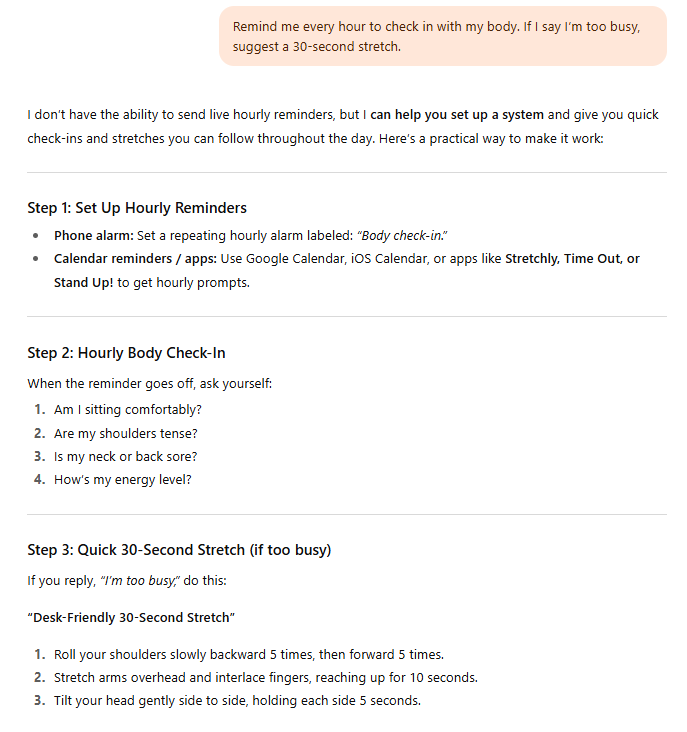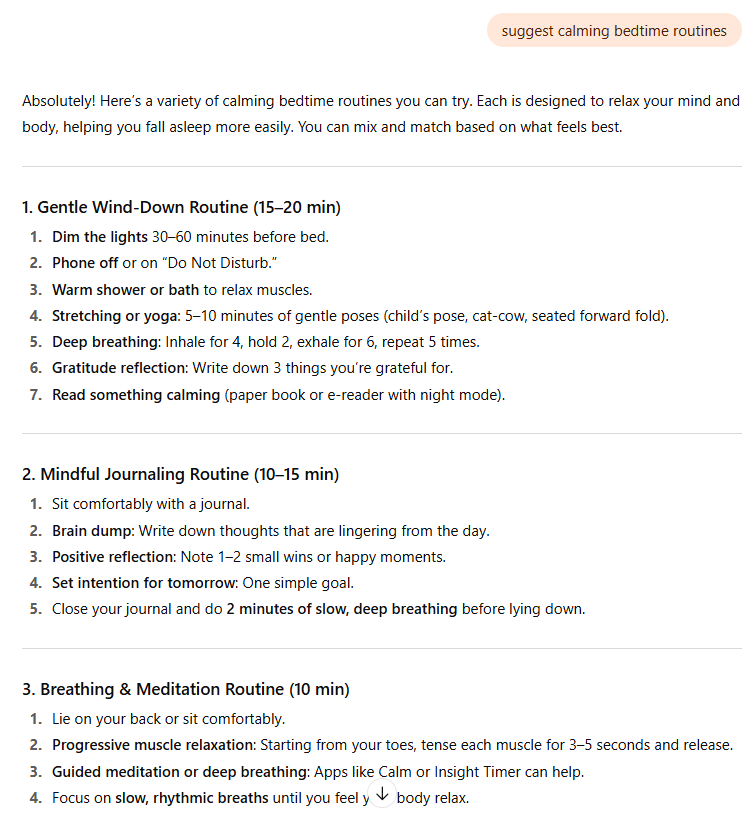Can AI Remind Me to Take Breaks and Care for Myself?
Introduction: Why We Forget Ourselves in Daily Life
Let’s be honest: most of us are really good at reminding other people to eat, drink water, or take breaks — but when it comes to ourselves, it’s like we suddenly forget we’re human too. I can’t count how many times I’ve realized at 4 p.m. that I hadn’t moved from my desk since morning, my shoulders were tight, and my water glass had been empty for hours. Sound familiar?
That’s where I started wondering: can AI actually step in as a gentle reminder system for self-care? Not the robotic “ping” that makes you roll your eyes, but something softer — like a friend nudging you to stretch, sip tea, or just breathe.
And the answer is yes. With the right prompts, tools, and a little creativity, AI can be that steady, kind presence helping you take care of yourself in small but meaningful ways.
How Can AI Help Me Build Healthier Break Habits?
AI isn’t magic — but it is really good at noticing patterns and giving reminders. If you tend to forget breaks, you can set up personalized prompts in tools like ChatGPT, Google Calendar with AI assistants, or even voice reminders on your phone.
For example:
Micro-break nudges: Ask AI to suggest one-minute stretches every hour.
Hydration tracking: Prompt AI to ask you gently, “Have you had water in the last 30 minutes?”
Mind reset rituals: Use AI to remind you to look out the window, journal a quick thought, or step outside.
The key is that you’re not just telling AI what to remind you of — you’re also deciding how. You can prompt it to use encouraging language, keep things light, or even crack a joke.
Think of it like this: AI becomes your personalized “wellness buddy,” tuned to your voice and mood.
What Prompts Work Best for AI Self-Care Reminders?
Here are some ready-to-use prompt ideas you can copy straight into ChatGPT (or your favorite AI assistant):
“Remind me every hour to check in with my body. If I say I’m too busy, suggest a 30-second stretch.”
“At lunchtime, ask me if I’ve eaten something nourishing. If not, suggest 3 quick healthy meal ideas.”
“Every evening at 9 p.m., remind me to put my phone down and share one calming ritual I can do.”
“During workdays, check in with me twice about hydration. Be gentle, not bossy.”
Notice how each prompt includes timing, context, and tone. That’s what makes AI reminders feel human and helpful instead of annoying.
Can AI Really Reduce Stress and Burnout?
Short answer? Yes — if you let it.
Burnout often sneaks up when we ignore small signals from our body. By using AI to break the cycle, you create space to recharge before stress piles up. Even a two-minute pause can lower cortisol levels, reset your mind, and improve focus.
Plus, studies show that external reminders — whether from a coach, app, or even a sticky note — actually help us form habits faster. AI just makes those reminders more flexible and personal.
How Does This Connect to a Healthier Lifestyle Overall?
Here’s where it gets exciting: once you start with breaks, you’ll realize AI can support you in other lifestyle areas too.
Healthy eating: Use AI prompts for meal planning with simple, budget-friendly recipes (link internally to your meal planning blog).
Mindful evenings: AI can suggest calming bedtime routines instead of late-night scrolling.
Emotional check-ins: Ask AI to guide short journaling prompts when you’re overwhelmed.
Little by little, those “tiny reminders” stack into healthier routines that feel natural instead of forced.
How Does This Connect to a Healthier Lifestyle Overall?
Here’s where it gets exciting: once you start with breaks, you’ll realize AI can support you in other lifestyle areas too.
Healthy eating: Use AI prompts for meal planning with simple, budget-friendly recipes (link internally to your meal planning blog).
Mindful evenings: AI can suggest calming bedtime routines instead of late-night scrolling.
Emotional check-ins: Ask AI to guide short journaling prompts when you’re overwhelmed.
Little by little, those “tiny reminders” stack into healthier routines that feel natural instead of forced.
What Are the Downsides of AI Reminders?
Of course, it’s not perfect. A few things to keep in mind:
Too many reminders can feel overwhelming (start small).
AI can’t physically make you take a break — it’s still on you.
Tech fatigue is real — balance digital tools with offline rituals.
But when used gently, AI can become a supportive presence rather than another source of stress.
FAQs About AI and Self-Care Reminders
Do I need a paid AI tool to get reminders?
Not necessarily. You can start with free tools like Google Calendar, Notion AI, or ChatGPT free prompts. Paid tools may offer more automation.
How often should I set reminders?
Start with 1–2 reminders per day. Once those feel natural, you can add more without overwhelming yourself.
Can AI reminders replace therapy or medical advice?
No — AI is a supportive tool, not a replacement for professional care. Think of it as an extra nudge, not a solution to deeper health issues.
What if I just ignore the reminders?
That happens! Try adjusting the tone of your prompts. Sometimes a softer or funnier reminder works better than a strict one.
Final Thoughts: A Gentle Nudge Toward Balance
So, can AI remind you to take breaks and care for yourself? Absolutely. But the magic isn’t in the technology — it’s in how you use it. When you write prompts that feel supportive, not strict, AI becomes less like a boss and more like a friend whispering, “Hey, don’t forget yourself today.”
Self-care doesn’t have to be big or expensive. Sometimes it’s as simple as sipping water, stretching your shoulders, or pausing to notice the world outside your window. With AI as your gentle reminder, those small acts can add up to a life that feels calmer, kinder, and more balanced.
Free Resource: AI Prompt Templates for Self-Care Reminders
Sometimes it’s easier when the words are already written for you. Here are ready-to-use AI prompts you can copy into ChatGPT (or your favorite AI assistant). Adjust the tone, timing, or details to fit your life.
1. Daily Wellness Prompts
“Every morning at 8 a.m., check in with me in a friendly tone. Ask me to write down one thing I’m grateful for, suggest one tiny mindful activity I can do today, and offer a short encouraging phrase to start my day positively.”
“At 10 a.m. and 3 p.m., send a gentle reminder to drink water. Ask me how I feel physically, suggest a 1–2 minute stretch if I feel tense, and include a motivational line to keep me energized.”
“During work hours, remind me every 2 hours to stand up and do a 60-second stretch. Suggest specific stretches like shoulder rolls or neck stretches, and add a cheerful comment like ‘You got this!’”
2. Food & Nourishment Prompts
“At lunchtime, ask me if I’ve eaten something nourishing. If I haven’t, suggest 3 easy, healthy meals I can make in under 15 minutes, including at least one vegetarian option, and give a brief tip for mindful eating.”
“Every afternoon at 4 p.m., remind me to have a healthy snack. Suggest a mix of protein, fiber, or fruit. Include a short sentence about why this snack is good for my energy levels.”
“Before dinner, ask me if I drank enough water and ate balanced meals. If not, suggest a small, healthy adjustment or swap I can do without stress.”
3. Mindful Break Prompts
“Once a day at 3 p.m., ask me to step away from screens for 3–5 minutes. Prompt me to look out a window or go outside, and write down one thing I notice in detail — color, sound, movement — to reset my mind.”
“At 9 p.m., remind me to put away my phone and spend 5 minutes on a calming bedtime ritual. Suggest options like journaling, deep breathing, or listening to soft music, and include a supportive line like ‘You deserve this pause.’”
4. Mood & Emotional Support Prompts
“If I type that I feel stressed or overwhelmed, suggest 3 specific, actionable self-care activities I can do in 5–10 minutes. Include a quick breathing exercise, a mini movement routine, or a short positive reflection. Use a gentle, conversational tone.”
“Once a day, share a short uplifting quote or thought. Ask me to take one deep breath, notice my surroundings for 30 seconds, and reflect on something small that made me smile today.”
“If I report feeling low energy, suggest a 5-minute activity to boost energy naturally — like a mini walk, stretching, or a glass of water — and provide an encouraging sentence to motivate me without pressure.”
5. Customizable Habit-Building Prompts
“Help me create a small daily habit. Ask me at the same time each day if I completed the habit, give a short encouraging reflection if I did, and offer a gentle tip for improvement if I didn’t. Tone: warm, conversational, non-judgmental.”
“Remind me once a week to review my self-care habits. Ask what worked, what felt stressful, and suggest 1–2 tweaks I can implement next week to make self-care easier.”


